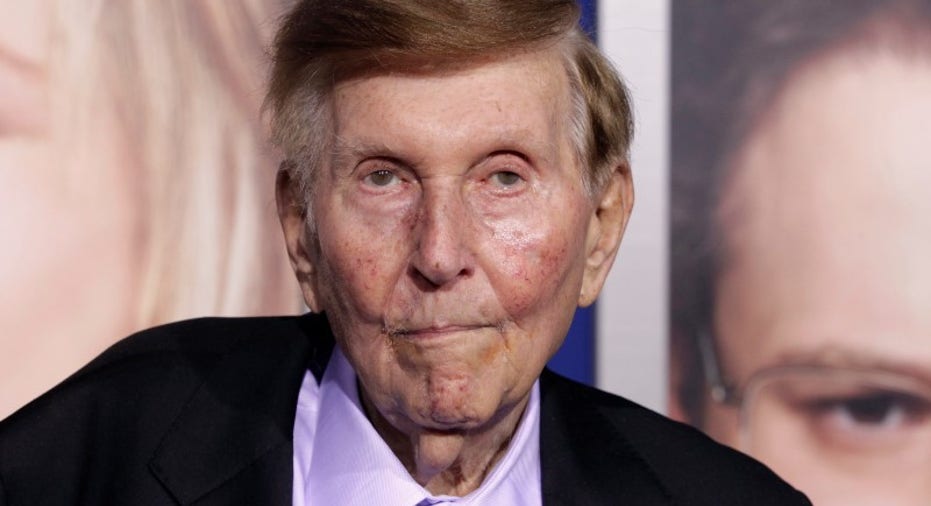Court Will Hear Next Chapter in the Redstone Saga

When the legal battle surrounding Sumner Redstone had its last substantive turn in court, the media mogul's longtime companion was arguing he was mentally incompetent when he evicted her and removed her as his health-care proxy. A California judge dismissed that suit.
Now, as a Massachusetts court prepares for a hearing Thursday in the latest chapter of the saga, the stakes are much higher and the legal terrain far more complex. At issue now is whether Mr. Redstone knew what he was doing in recent weeks when he reordered the power structure atop his media empire, which includes controlling stakes in Viacom Inc. and CBS Corp.
In addition to his mental competency, the case also will get into the murky legal question of whether Mr. Redstone came under "undue influence" from his daughter, Shari Redstone, in making the changes, and how recent events square with the fine points of estate plans that the 93-year-old crafted in 2002, when he set up a trust to oversee his holdings upon his death or incapacitation.
The suit has been brought by Viacom Chairman and Chief Executive Philippe Dauman and board member George Abrams, who were ousted from the board of Mr. Redstone's holding company, National Amusements Inc., as well as the trust. They are seeking reinstatement.
They say that Mr. Redstone is suffering from a worsening brain disorder, can't walk or speak and would never have wanted them removed if he were in command of his faculties. Mr. Redstone's team has said the mogul knows full well what he is doing. A key question is whether the Massachusetts court will allow an independent exam of Mr. Redstone.
Messrs. Dauman and Abrams brought the case in Massachusetts on the grounds that the trust is administered in the state. The Redstone camp wants to move the litigation to California, where the mogul resides.
The Massachusetts case could have major ramifications on a separate legal fight in Delaware court, where Viacom's lead independent director, Frederic Salerno, is fighting the attempted removal of himself and four other Viacom directors by National Amusements.
Showing undue influence is tricky. "It is one of those things that is very vague and very difficult to prove," said Dr. Edward Poa, chief of inpatient services at the Menninger Clinic, a psychiatric hospital in Houston, and an expert on cases in which a person's mental ability and vulnerability are in question.
Viacom will have to show that because of Mr. Redstone's vulnerability, he is "parroting someone else's ideas that have been planted over and over through repetition and isolation," said Peter Lichtenberg, director of the Institute of Gerontology at Wayne State University.
Messrs. Dauman and Abrams claim that is precisely what Ms. Redstone, 62, who is a vice chairman of CBS and Viacom and president of National Amusements, has managed to pull off.
"Under her influence, Mr. Redstone has grown increasingly isolated; his closest friends, advisers and colleagues have reached out to him and been rebuffed in a manner utterly uncharacteristic of him," they wrote in a legal filing, adding Ms. Redstone "controls every facet" of Mr. Redstone's life and he is "entirely dependent on her for food, care and medicine." This, the duo added, is part of her effort to "assume control of his businesses, which he long refused her."
Ms. Redstone, who has had a rocky relationship with her father, has repeatedly denied these charges. "It is absurd for anyone to accuse Shari of manipulating her father or controlling what goes on in his household," her spokeswoman said recently.
Working against Messrs. Dauman and Abrams is Mr. Redstone's history of replacing top executives.
Mr. Redstone's legal team argues that ultimately neither the mogul's current health nor Ms. Redstone are relevant to the removal of the two men. The lawyers argue that only a court or three doctors can declare Mr. Redstone incompetent, and since that hadn't happened before the dismissals, the decisions can't be challenged. As for undue influence, Mr. Redstone's side argues that is not grounds in the trust for contesting dismissals of trustees.
The lawyers for Messrs. Dauman and Abrams said in filings those arguments are "nonsensical."
The Redstone end-of-life power struggle has attracted much attention, given that two giant companies owning brands like MTV, Comedy Central, CBS and Paramount Pictures are involved. But on a smaller level, lawsuits over mental capacity and undue influence are becoming more commonplace as life expectancy grows.
"There is a tidal wave of these cases headed this way," according to neuropsychologist Jonathan Canick.
The Massachusetts case has made for strange bedfellows. In the competency suit brought last November by Manuela Herzer, Mr. Redstone's longtime companion, Mr. Dauman supported Mr. Redstone, saying in an affidavit that the mogul was "engaged and attentive" in a recent meeting.
Now, as Ms. Herzer seeks a rehearing of her case, her lawyer Pierce O'Donnell and Mr. Dauman are on the same page. In a declaration filed on behalf of Messrs. Dauman and Abrams, Mr. O'Donnell compared Mr. Redstone to a "wax figure at Madame Tussauds."
In the Herzer case, the judge didn't rule on Mr. Redstone's mental competency -- he simply said there was clear enough evidence of Mr. Redstone's wishes with regard to Ms. Herzer.
There is "a very different level of functioning" required to justify the complex business decisions Mr. Redstone has recently undertaken, said Jean Stewart, a former probate judge on caretaker rulings.



















